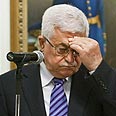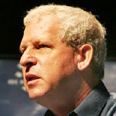
'Blow to Abbas'
Photo: AFP

Eiland. 'Gesture with no results'
Photo: Ofer Amram

Beilin. 'It will be a disaster'
Photo: Alex Kolomoisky

Prof. Meital. Weakening Abbas
Official: Freeze a gesture to US, not to Abbas
Former National Security Council head believes settlement construction freeze by Israel will only weaken Palestinian president in his people's eyes, while Hamas may be able to present real achievements in Shalit deal. Former Minister Beilin: How did Americans reach such a ridiculous situation?
Will the settlement construction freeze announced
by Prime Minister Benjamin Netanyahu
strengthen Palestinian President Mahmoud Abbas,
or is the effort doomed to fail? And who is the move directed at?
He recalls Israel's
past attempts to bolster Palestinian officials, and even then – the results were not pleasant. "Any Israeli attempt to bolster one Arab leader or another in order to make him more successful has always led to the opposite outcome. It's true in regards to Fatah
versus Hamas,
it's also true that Israel tried to nurture an organization against Fatah called 'the village's association', it's true in regards to the Phalanx in Lebanon.
According to former National Security Council head Giora Eiland, "It's clear that this was a request by the Palestinians for a gesture to Abu Mazen (Abbas). But if you ask me, the gesture here is towards the Americans – not towards Abu Mazen."
Right-Wing Protest
Yesha Council management and municipal heads in West Bank to hold emergency session to decide how to move forward in campaign against building freeze
"There is an iron rule in the Arab world: If there is someone Israel seeks to bolster, it will lead to the opposite outcome and will weaken them. They lose legitimization."
Eiland also criticizes the move taken by Israel. "If things are done in a discrete and sophisticated manner, it's one thing, but here everything is clear and on the table."
According to the former National Security Council director, Abu Mazen won't be credited for the construction freeze, as opposed to Hamas. "If the Shalit deal is implemented, this is a real thing they will be able to present to the Palestinian people and say, 'This is thanks to us.'
"We must notice that Hamas is also smart enough to ask that some of the prisoners released will be Fatah members or Israeli Arabs. They are presenting themselves as the real leaders caring for everyone. Hamas' achievement is real, while the gesture to Abu Mazen will end, if all goes well, without any results."
Prof. Yoram Meital, chairman of the Chaim Herzog Center for Middle East Studies and Diplomacy at Ben-Gurion University, refers to the complexity in Netanyahu's statement about a construction freeze from Abbas' point of view.
"The way Abu Mazen sees it, there is in fact an improvement and change in the prime minister's statement. The Palestinian Authority is definitely viewing this as a change of policy, but nearly the entire Palestinian leadership will see this was an insufficient change from their point of view."
And what about resuming the peace process? "Ever since the Obama administration took office, the settlement construction issue has been made a top priority for the American administration and the Palestinian Authority, with the pressure on Israel increasing in the past six months.
"Is the declaration on a construction freeze enough for a serious change? It's not enough for resuming a significant diplomatic change, particularly when Jerusalem is removed from the equation, as we are talking about new licenses for housing construction while the building of institutions continues, and in light of the fact that the freeze will end in 10 months."
Apart from the chances of resuming the negotiations, Prof. Meital says that in the most important arena for Abbas – the Palestinian street – the gesture is insufficient, particularly ahead of a possible prisoner exchange deal between Israel and Hamas.
"For Abu Mazen, the Palestinian street is more urgent and significant. The right-wing government's composition has weakened Abbas, and if the deal is indeed materialized, Hamas will grow significantly stronger.
"For Abu Mazen, his sandglass as a leader is low and he doesn't want to be written in Palestinian history as one who accepted Israeli demands for resuming the negotiations. He will say this is not enough and ask the Americans to continue pressuring Israel. He is being told more and more that he should get off the stage while identified with a principle, rather than go to negotiations which have a zero chance of materializing."
Beilin: A critical blow to Abbas
Former Minister Yossi Beilin, president of Beilink Business Foreign Affairs and chairman of the Geneva Accord, stresses that the construction halt, in the way it was achieved and the way it was worded, is a critical blow to Abbas.
"It's almost a joke to say that such a thing is a gesture to Abu Mazen," he says. "It's a blow to Abu Mazen. Instead of preparing an Israeli-Palestinian agreement, we are making an agreement with the Americans behind their backs which is hurting Abu Mazen. The Americans are basically indirectly legitimizing construction in east Jerusalem, and this is something Abu Mazen will never be able to accept."
Beilin claims he has already warned in the past that if Israel makes such one-time declarations it will be a disaster.
"The Americans will say that this is important progress and then call the Palestinians to enter negotiations, but in fact Abu Mazen is being weakened once again. Netanyahu can say, we did this gesture and the Palestinians are not accepting, but in the meantime the construction continues and we are in the same situation, and this in fact creates the possibility for the next violent outbreak."
Beilin believes that Netanyahu's announcement marks the continuation of a diplomatic freeze. "There is no resumption of negotiations. I don’t understand who the smart person is here, how the Americans reached such a ridiculous situation. They put the Palestinians on the tallest tree when they said that the precondition was to stop construction in the settlements. Since then they have changed their minds and then reached a compromise behind the Palestinians' back."
According to the former minister, "The only thing that can be done now is to call on the sides to return to negotiations which would include a complete settlement freeze."















